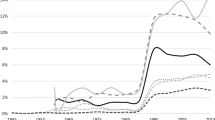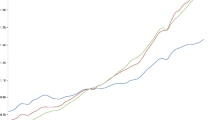Abstract
The Theory of Probabilistic Functionalism, as a general theory of how organisms interact with complex environmental systems, provides a useful framework for describing essential processes of sustainability planning groups. Particularly, the mechanism of producing evolutionary stable representations of and judgment about the environment has important implications for sustainability transitions. In comparison with biological evolution, the environment changes much faster in social phenomena, and the selection dynamics working on heterogeneous groups for successful survival would be incomplete. That makes continuous learning by the members of planning groups as well as collective decision-making among them critically important. The policy of open data for assembling, distributing, and utilizing various kinds of data will facilitate vision creation, strategy development, and consensus building with stakeholders for sustainability transitions.
Similar content being viewed by others
References
Avelino F, Grin J, Pel B, Jhagroe S (2016) The politics of sustainability transitions. J Environ Plan Policy Manage 18(5):557–567
Beinhocker ED (2006) The origin of wealth: evolution, complexity and the radical remaking of economics. Harvard Business School Press, Boston
Dosi G, Nelson RR (2010) Chapter 3—technical change and industrial dynamics as evolutionary processes. In: Bronwyn HH, Nathan R (eds) Handbook of the economics of innovation. Elsevier, Amsterdam
Elster J (1989) Nuts and bolts for the social sciences. Cambridge University Press, Cambridge
Marshall A (1890) Principles of economics. Macmillan, London
Nelson RR, Winter SG (1982) An evolutionary theory of economic change. Belknap Press of Harvard University Press, Cambridge
Scholz RW (2011) Environmental literacy in science and society: from knowledge to decisions. Cambridge University Press, Cambridge
Scholz RW (2017) Managing complexity: from visual perception to sustainable transitions—contributions of Brunswik’s theory of probabilistic functionalism. Environ Syst Decis 37(4):381–409
Veblen TB (1898) Why is economics not an evolutionary science? Q J Econ 12(3):373–397
Yarime M (2017) Facilitating data-intensive approaches to innovation for sustainability: opportunities and challenges in building smart cities. Sustain Sci 12(6):881–885
Author information
Authors and Affiliations
Corresponding author
Additional information
This Perspectives paper is a comment on Scholz’s “Managing complexity: from visual perception to sustainable transitions—contributions of Brunswik’s Theory of Probabilistic Functionalism”, Environ Syst Decis. https://doi.org/10.1007/s10669-017-9655-4.
Rights and permissions
About this article
Cite this article
Yarime, M. Learning and open data in sustainability transitions: evolutionary implications of the theory of probabilistic functionalism. Environ Syst Decis 38, 88–91 (2018). https://doi.org/10.1007/s10669-017-9668-z
Published:
Issue Date:
DOI: https://doi.org/10.1007/s10669-017-9668-z




